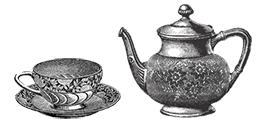The British East India Company's Monopoly on Tea
 Source: Jane Pettigrew
Source: Jane PettigrewCanton, China, the only trade port open to the western world before the Opium Wars
 Source: William Ukers
Source: William UkersEast India House, Leadenhall Street, London
 Source: theteahorsecaravan.com
Source: theteahorsecaravan.comEast India Company controlled and limited the supply of tea by fixing prices artificially high for greatest profits and to ensure demand
The British East India Company was a trading company that brought home vast riches and helped England become a maritime power. Through the East India Company, and with enormous support of the British people, Britain was able to expand the Empire and become a world contender in economics, politics, and commerce.
The East India Company had enormous power. It operated autonomously as an extention of the British Crown, as a ruling nation over India, by commanding armies, and by minting money. The East India Company also acquired vast amounts of territory for England, increasing its own position in world trade. Become a "governor general" of a monopoly!
Other countries, including the French and Dutch, operated East India companies, but Britain dominated the competition, becoming the East India Company. As the East India Company edged out the competition and gained control of most of India, it created a monopoly in trade, becoming the only importer of Indian-made goods to Europe and the only legal supplier of Chinese tea in England.
This dual monopoly was a powerful combination that kept other East India Companies from posing any real threat to British trade from Asia.
The East India Company fixed tea prices artificially high, and the British Crown added significant taxes to each pound of tea. These exorbitantly high prices kept the middle and lower classes from being able to afford legal tea. Instead, they purchsed cheaper, easily accessible smuggled tea. By the 18th century, as much tea was smuggled into England as was legally purchased through the East India Company.
The East India Company operated thousands of miles from the British crown, and the company's dual role of trading company and a smaller-scale ruling entity, concerned citizens in England. Distance, bribery, extortion, when combined with ambitious officials and a powerful army at its disposal, eventully bred corruption, mismanagement, and fraud. The Company lost massive profits from tea smuggling, and found itself in an increasingly dire financial situation by the end of the 18th century.
The East India Company controlled India until 1857. The local population revolted in the Indian Mutiny, forcing the British Crown to take over. This began "Raj" rule, which lasted until 1947.
The British Crown dissolved the East India Company in 1874 after 274 years in business.
 Source: liv.ac.uk
Source: liv.ac.ukQueen Elizabeth first chartered the British East India Company in 1600.
Chinese products, such as porcelain, silk, and spices were new, unknown, and very welcome back home.
But the British only had English woolen broadcloth to trade, which was not useful in the semi-tropical region of Canton. It may have been welcome in the cold northern regions of China, but Canton was the only port open to foreign trade.
The only commodity the Chinese wanted from the British was silver.
 Source: mellowmint.deviantart.com
Source: mellowmint.deviantart.comBy 1669, the East India Company prohibited all other countries from importing any products into England, especially tea, creating a monopoly on tea into Britain that lasted until 1834.
The British crown ended the Company's India monopoly in 1813, allowing private merchants to sell Indian goods. The Company held onto the Chinese tea monopoly for an additional 20 years.
 Source: fitzmuseum.cam.ac.uk
Source: fitzmuseum.cam.ac.ukWhile traipsing around India in 1823, British explorer Charles Bruce discovered indigenous tea plants in Assam, but the East India Company did all it could to discourage tea cultivation in India.
The East India Company had no incentive to encourage commercial production of tea in India. Instead, it protected its monopoly on the lucrative Chinese tea trade.
The East India Company was eventually forced to assist Britain in finding land for growing tea in British-controlled India.
 Source: mellowmint.deviantart.com
Source: mellowmint.deviantart.comIndian-grown tea turned out to be one of the most lucrative sources of wealth and government revenue in the British Empire.
Tea thrived on British plantations throughout India, Assam, Burma and Ceylon (Sri Lanka), and helped Britain become the biggest consumers of tea, second only to the Chinese.
Thousands of Englishmen moved to India to make their fortune growing tea and shipping it back to dealers in London.


